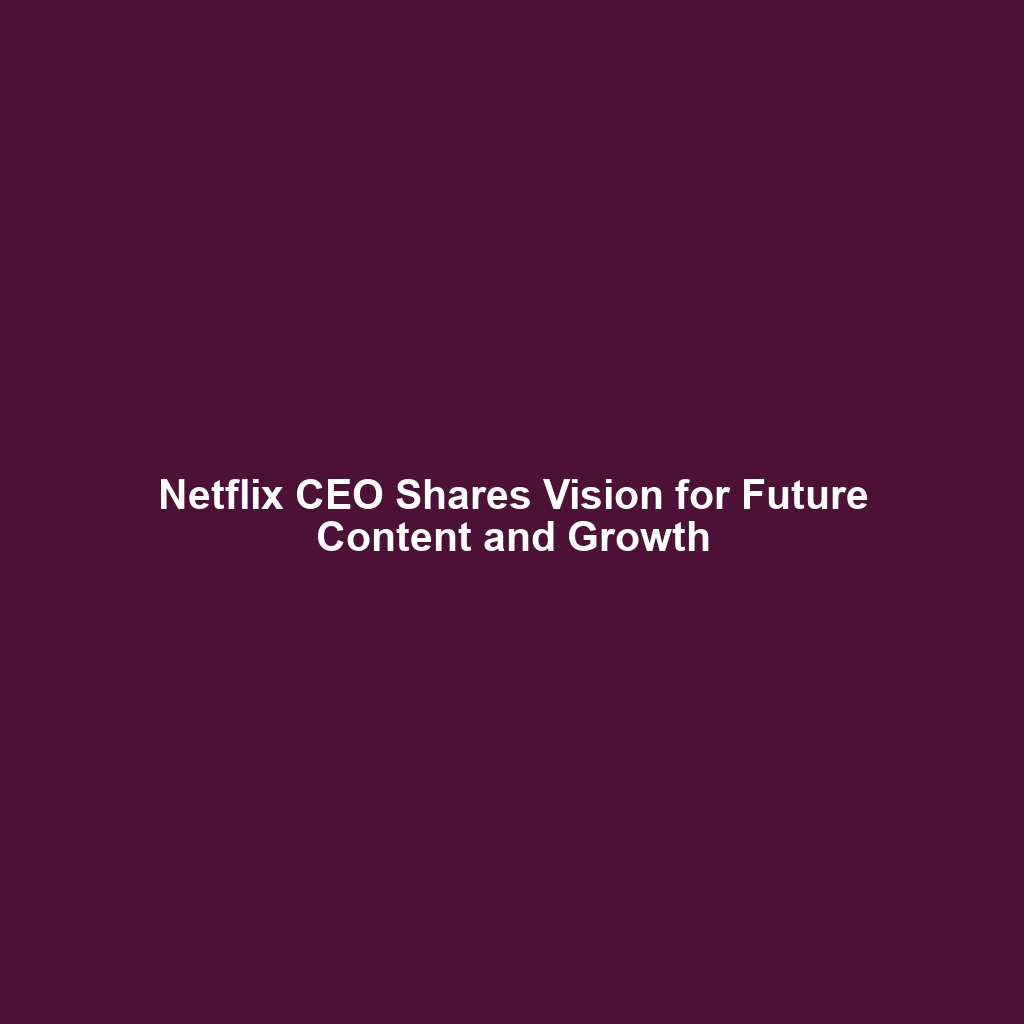Your cart is currently empty!
Tag: media analysis.

Netflix CEO Shares Vision for Future Content and Growth
Netflix CEO Shares Vision for Future Content and Growth
Netflix CEO Shares Vision for Future Content and Growth
In a recent interview, Netflix CEO Ted Sarandos outlined the streaming giant’s strategic vision for future content creation and global expansion. As competition in the streaming sector intensifies, Sarandos articulated a clear direction focused on innovation, audience engagement, and the evolution of the company’s business model.
Emphasizing Innovative Content Creation
Sarandos emphasized that Netflix will continue to invest heavily in original programming, which he considers crucial for retaining subscribers in an increasingly crowded market. “The backbone of Netflix will always be original content,” Sarandos stated, highlighting acclaimed series such as Stranger Things and The Crown that have established Netflix as a leader in entertainment.
The company’s strategy includes diversifying content genres and investing in storytelling that resonates with a global audience. According to Sarandos, “We want to tell stories that not only entertain but also connect with various cultures around the world.” He noted that international productions have seen significant success, pointing to hits like the Spanish series Money Heist and the South Korean phenomenon Squid Game.
Expanding Global Reach
One of the key pillars of Sarandos’s vision is the expansion of Netflix’s global footprint. As of now, Netflix operates in over 190 countries, and Sarandos indicated that the company is keen to deepen its local partnerships, develop regional content, and tailor its offerings to meet the preferences of diverse international audiences.
According to eMarketer, Netflix currently leads the streaming market with a projected 237.4 million subscribers globally as of 2023. Sarandos acknowledged the importance of adapting to local markets, stating, “We’ve learned that localization is not just about translation, but about understanding the local culture and its storytelling nuances.”
Navigating Competition in the Streaming Landscape
With an increasing number of competitors entering the streaming space—such as Disney+, Amazon Prime Video, and Apple TV+—Ted Sarandos recognizes the challenge ahead. “Every new service that launches only makes the content ecosystem richer,” he stated, while also acknowledging the need for Netflix to stay ahead of trends.
Industry experts suggest that the key to Netflix’s continued success lies in its ability to adapt quickly. Kurtis McBride, a media analyst at BoxOfficePro, commented, “Netflix has to constantly innovate. As content becomes more abundant, it’s the unique and high-quality programming that will draw viewers in.”
Exploring New Business Models
Sarandos also discussed the potential for evolving Netflix’s business model, possibly adding ad-supported tiers in response to market demands and consumer behaviors. “We are exploring different pricing structures that could cater to different segments of our audience,” he mentioned, hinting at potential changes to the subscription model.
This shift is part of a broader trend in the streaming industry where services are experimenting with ad-supported options to attract cost-conscious subscribers. Recent reports suggest that Disney+ and HBO Max have also ventured into ad-supported avenues, indicating a shifting paradigm in revenue streams for streaming services.
Commitment to Diversity and Inclusivity
Sarandos stressed that Netflix is committed to fostering diversity not only in its content but also behind the camera. “We are making bold moves to champion diversity and representation in storytelling,” he stated, underscoring current initiatives aimed at elevating underrepresented voices within the industry.
The push for inclusivity has gained importance in both corporate and creative environments, reflecting societal trends toward greater representation. Studies show that diverse teams lead to more innovative solutions, which is essential in a competitive market like streaming.
Future Challenges and Opportunities
Looking forward, Sarandos acknowledged several challenges and opportunities that Netflix faces. From emerging technologies to shifts in consumer behavior, the landscape of digital content is rapidly changing. “We are always keeping an eye on how technology evolves and influences the ways people consume entertainment,” he noted.
As technologies such as virtual reality and artificial intelligence continue to develop, Sarandos indicated that Netflix will explore potential applications for creating immersive viewer experiences. “The future of content is not just about watching but experiencing storytelling in new ways,” he affirmed.
Conclusion
Ted Sarandos’s vision for Netflix underscores the company’s commitment to innovation in content creation and expansion into new markets. As the streaming landscape evolves, Netflix’s ability to adapt its business model while emphasizing diversity and inclusivity will be vital for maintaining its position as a market leader.
With the future of streaming still in flux, viewers can expect Netflix to remain at the forefront of the industry by continually evolving its strategies and offerings in response to audience needs and technological advancements.
